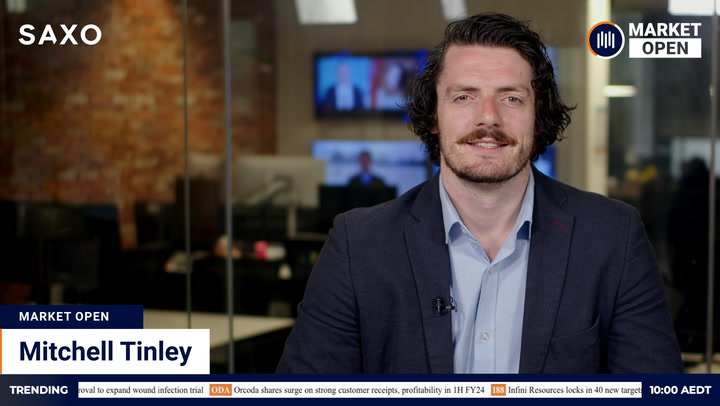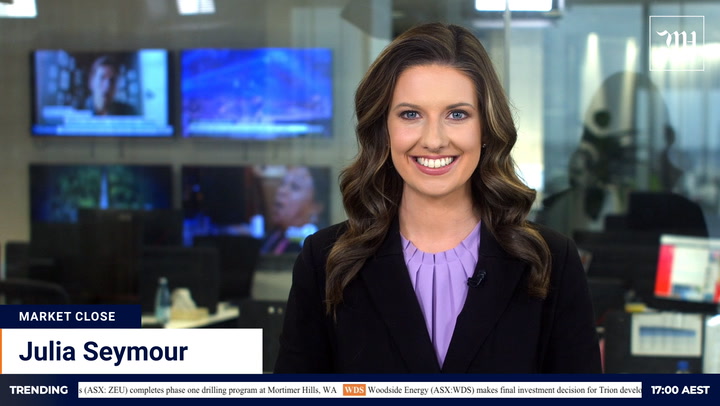Australian shares were set to open lower following a third straight losing session on Wall Street after strong economic data bolstered the case for higher rates.
ASX futures declined 58 points or 0.84 per cent as the main indices in the US fell around 1-1.1 per cent. A loss of that scale on the S&P/ASX 200 would strip the index of its slender gain for the month.
Oil dropped more than 5 per cent as economic growth worries outweighed supply concerns. Iron ore sank below US$100 a tonne for the first time in five weeks. Copper closed at a two-week low. Gold settled at its weakest in more than a month.
Wall Street
US stocks gave up early gains as a record number of job openings indicated recent interest rate rises have yet to slow the labour market. A rebound in consumer confidence underlined the Federal Reserve’s argument that rates will have to rise to slow consumer spending and bring down inflation.
The S&P 500 dropped 44 points or 1.1 per cent to a third straight loss. The Dow Jones Industrial Average gave up 308 points or 0.96 per cent. The Nasdaq Composite shed 135 points or 1.12 per cent.
Labor Department data showed the economy was still going gangbusters. July figures implied there were two jobs available for every unemployed American, underlining the tightness of the labour market.
Job openings increased by 199,000 to 11.239 million last month, well ahead of economists’ expectations. Initial figures for the previous month were revised sharply upwards.
“The economy isn’t giving [the Fed] any reason to hold back,” Christopher Rupkey, chief economist at FWDBONDS, told Reuters. “The labor market is strong as a bull, two jobs out there for the unemployed to choose from.”
A separate report showed consumer confidence rebounded sharply after three months of decline. The Conference Board confidence index jumped to 103.2 this month from 95.3 in July. The data showed increases in the number of Americans planning to go on vacation and buy cars and other significant household purchases.
Fed officials continued to talk up the need to raise rates. New York Fed President John Williams told the Wall Street Journal, “We need to have somewhat restrictive policy to slow demand, and we’re not there yet.”
Williams said the federal funds target rate needed to be “a little bit or somewhat” above 3.5 per cent. The target rate is currently 2.25-2.5 per cent.
Tech and other growth sectors were pressured by increases in rates. The yield on two-year treasuries hit a new 15-year high.
Energy was the biggest drag after crude oil succumbed to worries about the impact of higher rates on demand. The VIX, or volatility index, rose for a third night to a six-week high.
Australian outlook
The S&P/ASX 200 was somewhat misdirected yesterday by positive signals from US futures and will therefore have to give a bit back today. The Australian benchmark bounced almost 0.5 per cent as tech and energy stocks took wing.
Neither sector looks likely to offer much support this session. The S&P 500 energy sector skidded 3.36 per cent. Tech dropped 1.08 per cent.
All 11 US sectors declined. Least-worst were financials -0.42 per cent and healthcare -0.66 per cent.
Basic materials slid 1.71 per cent on demand worries. BHP and Rio Tinto logged sharp falls (more below).
Selling today should be kept in check to some extent by month-end rebalancing. The index could still eke out a slim gain for the month if it loses less than 53 points by this afternoon’s close.
The month-long domestic reporting season reaches an unofficial conclusion today. Among the last to report are toll road operator Atlas Arteria and gold miner St Barbara.
Dividend payments will be an increasing headwind for the market for the next month. Among the larger companies going ex-dividend today are Wesfarmers, Woolworths, OZ Minerals, Tabcorp, Bega Cheese, Iress, Endeavour Group and Treasury Wine Estates.
A slew of economic data is scheduled for 11.30 am AEST. Alongside domestic monthly private-sector credit and quarterly construction work data are measures of Chinese manufacturing and services-sector activity.
The dollar was pressured by a move into the greenback in anticipation of higher US rates. The Aussie declined 0.75 per cent to 68.55 US cents.
Commodities
Oil slumped more than 5 per cent as the prospect of slower demand from the US outweighed Saudi threats to reduce output. An OPEC+ source told a Russian news agency the cartel was not currently discussing production cuts.
“Coordinated hawkish action by central banks around the globe is threatening economic recovery, and the risk of a recession taking place is ever increasing. With this particular threat, the path of the least resistance is skewed to the downside,” Naeem Aslam, chief market analyst at AVATrade, said.
Brent crude settled US$5.78 or 5.5 per cent lower at US$99.31 a barrel. The US benchmark declined US$5.37 or 5.5 per cent to US$91.64.
Iron ore dropped under US$100 a tonne as steel prices responded to escalating Covid restrictions in Dalian and Shenzen and to news environmental curbs will cap production at Tangshan. Minmetals Futures said production at Tangshan, a major steel centre, will fall by more than eight million tonnes in the second half.
The most-traded January ore contract dropped 5 per cent on the Dalian Commodity Exchange to 682 yuan (US$98.57) a tonne. The spot price for ore landed in China eased 63 US cents or 0.6 per cent to US$104.49 a tonne.
Industrial metal prices felt the cold winds blowing from China and the US. Benchmark copper on the London Metal Exchange dived 3.6 per cent to US$7,893 a tonne, its lowest in more than two weeks.
Aluminium lost 4.1 per cent, tin 4.5 per cent, zinc 2.2 per cent, nickel 1.2 per cent and lead less than 0.1 per cent.
BHP‘s US-traded depositary receipts slid 4.25 per cent. The miner’s UK listing sagged 4.33 per cent. Rio Tinto gave up 4.17 per cent in the US and 3.31 per cent in the UK.
Gold faded to its lowest close in more than a month as the US dollar strengthened. Gold for December delivery settled US$13.40 or 0.8 per cent weaker at US$1,736.30 an ounce. The NYSE Arca Gold Bugs Index dropped 2.73 per cent.





